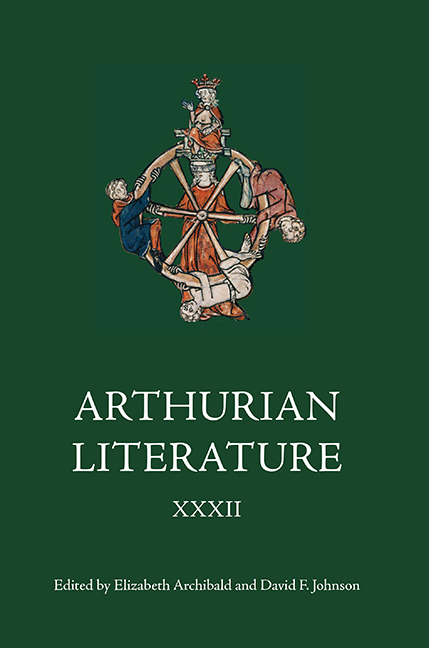Book contents
- Frontmatter
- Contents
- List of Illustrations
- General Editors’ Foreword
- List of Contributors
- I Wounded Bodies: Kingship, National Identity and Illegitimate Torture in the English Arthurian Tradition
- II The Place of Emotion: Space, Silence and Interiority in the Stanzaic Morte Arthur
- III Another Source for Malory’s ‘Tale of Sir Gareth’
- IV ‘Warre and Worshyppe’: Depictions of Battle in Malory’s Le Morte Darthur
- V Malory’s ‘Chivalric Cliques’: Public and Private Felyshyp in the Arthurian Community
- VI Scribal Modifications to Concluding Formulae in the Winchester Manuscript
- VII Heraldic Imagery in the Embroidered Tristan Narratives
- VIII Update to the List of Manuscripts of Geoffrey of Monmouth’s Historia Regum Britanniae
- Contents of Previous Volumes
V - Malory’s ‘Chivalric Cliques’: Public and Private Felyshyp in the Arthurian Community
Published online by Cambridge University Press: 11 May 2021
- Frontmatter
- Contents
- List of Illustrations
- General Editors’ Foreword
- List of Contributors
- I Wounded Bodies: Kingship, National Identity and Illegitimate Torture in the English Arthurian Tradition
- II The Place of Emotion: Space, Silence and Interiority in the Stanzaic Morte Arthur
- III Another Source for Malory’s ‘Tale of Sir Gareth’
- IV ‘Warre and Worshyppe’: Depictions of Battle in Malory’s Le Morte Darthur
- V Malory’s ‘Chivalric Cliques’: Public and Private Felyshyp in the Arthurian Community
- VI Scribal Modifications to Concluding Formulae in the Winchester Manuscript
- VII Heraldic Imagery in the Embroidered Tristan Narratives
- VIII Update to the List of Manuscripts of Geoffrey of Monmouth’s Historia Regum Britanniae
- Contents of Previous Volumes
Summary
Elizabeth Archibald's look at the use of the term felyshyp in Malory's Le Morte Darthur is a promising starting point for discussing the ways in which private and public friendships affect the chivalric community. Archibald's assertion that ‘there is not only the public and communal felyshyp of the Round Table, but also private and individual felyshyp, based on camaraderie and admiration’ best captures the variety of relationships found among Round Table Knights. However, it is Corinne Saunders's recent claim, that in Malory's Morte ‘individual friendships relate closely to, but also threaten, the politics of fellowship’, that warrants further critical investigation.
Multiple definitions of knightly companionship fall under the umbrella of felyshyp, yet I focus on two very distinct types in Malory: the public fellowship, which is centred on knights’ shared physical prowess, and the private friendship, which focuses more on individual, intimate bonds between knights. While the idea of felyshyp provides a larger social context in which men interact, it does not necessarily mean that all of its members engage in private friendships. Relationships between knights in Malory are so often transitory that it is not feasible to form and maintain selective private friendships, particularly those that pose a significant challenge to the overall scheme of the community. Archibald underscores this greater challenge in noting ‘temporary fellowships formed when knights join together in groups for tournaments, and also the permanent – and, towards the end, problematic – fellowships based on kinship and clan loyalties, notably those adhering to Gawain and Lancelot’. To further build on Archibald's assertions, I argue that friendship and fellowship are two differing concepts in Malory. Cicero's classical treatise De amicitia is helpful for understanding the private relationships occurring in the Arthurian community. Ciceronian friendship, henceforth referred to as amicitia, is based on the notion that because of love and shared virtues, the bond is so intimate that the two souls become one. Of particular importance is the time and effort it takes to cultivate such relationships. Public friendships, otherwise referred to as felyshyp, on the other hand, can be seen as an opposing model, one that neatly fits the goals of Malory's chivalric community because such bonds that occur among knights are based on overall communal qualities, mainly being a member the Round Table.
- Type
- Chapter
- Information
- Arthurian Literature XXXII , pp. 105 - 122Publisher: Boydell & BrewerPrint publication year: 2015



